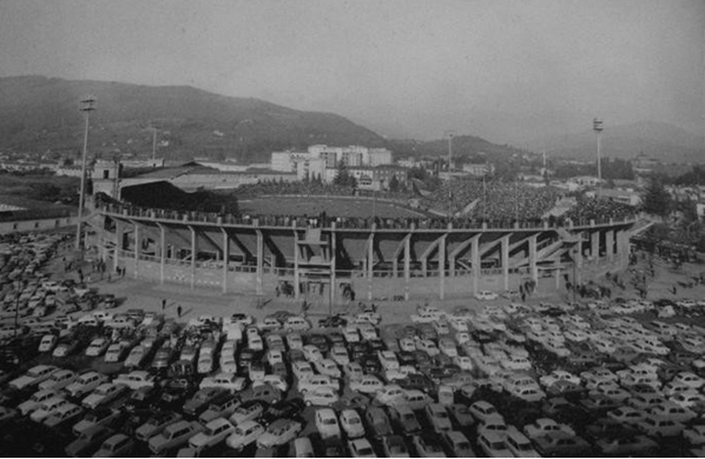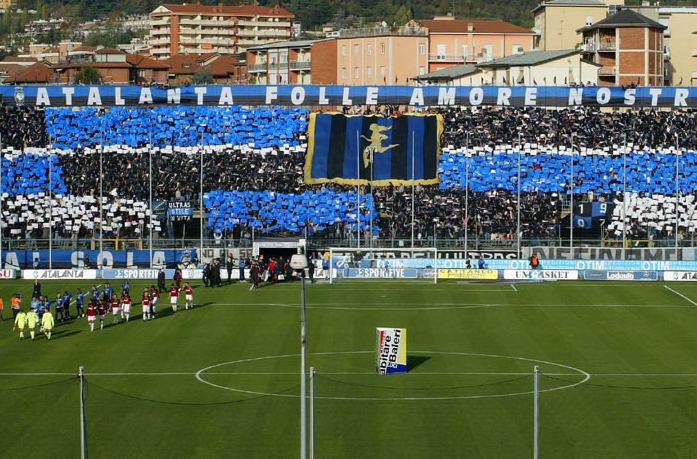The Stadio Atleti Azzuri d’Italia in Bergamo is home to Atalanta B.C., Serie A club and now a member of the Europa League. The site of the current ground was used firstly, between 1905 and 1910, by Bergamo football club and later, between 1913 to 1920 by the Bergamo fencing and gymnastics company. You can see below the original site of the ground when it was just the ‘Ippodromo’. The relationship between how the site looked then and the structure of the ground today is clear.
In 1924, construction began on the two side stands, creating a capacity of 12,000. The stadium was initially named ‘Mario Brumana’ after the fascist soldier from the Imagna valley at the foot of the Alps in Bergamo. After World War Two and the fall of fascism, the title was dropped for the simply named ‘Municipal Stadium’. Today, the majority of La Dea’s ultras are fervently left wing, a far cry from their fascist beginnings.
Both the pitch and running track at the ground were used as a multi-purpose sports ground, incorporating a basketball court, swimming pool and two tennis courts.
After the Second World War in 1949, extension work began, again on the side stands, but also on what would later become the Curva Sud, or what is now known as the Curva Morosini (see below, just don’t try and make a quick getaway at half time!)
Subsequently, in the 1960s the South stand became the metal structure that still stands today. The beginning of the ‘90s saw the then and current president Antionio Percassi oversee the creation of the Creberg stand. Finally, in 2015, pitch side views were introduced, a relatively revolutionary concept for Italian stadiums giving fans an opportunity to be a few feet from Mister Gasperini.
This year Atalanta became just the fourth Serie A side to buy the tender for their stadium, alongside Juventus, Undinese and Sassuolo. The club was selected as the preferred bidder, unsurprisingly beating off competition from Liga Pro outfit U.C. Albinoleffe, the club that have ground shared with Atalanta since 2003. La Dea won the bidding with a fee of €8.608,000, 10% above the asking price.
Like many Italian stadia, the Atletti Azzuri is generally considered to be out of date, with inadequate facilities, poor views and a lack of safety. The ground does not meet UEFA criteria and thus Atalanta will play their European games at Sassuolo’s Mapei Stadium next season. Conditions for considerable improvements were made alongside the sale of the ground – Atalanta must complete regenerations of the stadium and surrounding areas within a six-year period.
The mayor of Bergamo, Giorgio Gori was quoted as saying, “we want a high-quality stadium, that will benefit the city as well as the club itself.” In previous years, significant ground improvements have been limited, however with the purchase of the ground, President Percassi can finally create a modern facility for the Nerazzurri. Percassi has explained work on the stadium will begin in the summer of 2018, improvements will be made in subsequent summers with completion planned for the beginning of the 2020/21 season.
Percassi wishes to create a stadium like those typically seen in England, “the logic is the same as the Juventus Stadium and the English stage, but let me stress that what we are doing is something really special.”
It’s clear that work is needed, but what will this mean for the atmosphere? The Atalanta Ultras produce noise and colour on an unprecedented level and it could be argued that the bare concrete slab of a stadium just adds to the intimidating welcome opposition fans receive on arrival. Furthermore, the Ultras are a fierce, principled set of fans. When they don’t like something, they act. Antonio Conte’s disastrous spell as Atalanta coach ended with a police escort away from the stadium as the hard-core fans reached boiling point. Conte resigned the next day.
The Ultras, who hold substantial power at the club, may not take kindly to their beloved old ground becoming anglicised, and who could blame them? In an age of soulless bowl-like stadiums, the Stadio Atleti Azuri d’Italia is a welcome throwback to a previous era.
Words by Henry Singleton:@henry_singleton
Henry’s obsession with football led him to study the subject, alongside business, at university. He is a committed Ipswich Town fan with a passion for Italian football.

